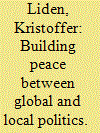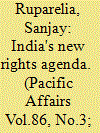| Srl | Item |
| 1 |
ID:
091971


|
|
|
|
|
| Publication |
2009.
|
| Summary/Abstract |
What are the ethical implications of the shortcomings of liberal peacebuilding operations? This article addresses the problem by investigating the normative premises of liberal peacebuilding and its critics. Three ideal types of peacebuilding are singled out to illuminate the normative logic of current 'revisionist' proposals. These are: 're-liberal peacebuilding' which prescribes a more coercive approach; 'social peacebuilding' that emphasizes local agency and the promotion of socioeconomic rights; and 'multicultural peacebuilding' that roots peace in indigenous norms and institutions. These alternatives are assessed with regard to their ability to promote both the autonomy and the basic needs of the affected population. It is concluded that only 'social peacebuilding' passes this test. It exemplifies a model of global governance where a cosmopolitan human rights agenda is consistent with the communitarian defence of political autonomy and cultural diversity.
|
|
|
|
|
|
|
|
|
|
|
|
|
|
|
|
| 2 |
ID:
128534


|
|
|
|
|
| Publication |
2013.
|
| Summary/Abstract |
Since 2004, India has introduced a series of progressive national bills that enact a right to new civic entitlements, ranging from information, work and education to forest conservation, food and basic public services. What explains the emergence of these laws? How are the rights conceived by these acts conceptualized, operationalized and pursued? What are the promises, challenges and risks-legal, political and economic-of enshrining socioeconomic entitlements as formal statutory rights? This paper engages these questions. In part 1, I argue that three slow-burning processes since the 1980s, distinct yet related, catalyzed India's new rights agenda: high socio-legal activism, rapid uneven development and the expanding popular foundations of its federal parliamentary democracy. Significantly, all three processes exposed the growing nexus between political corruption and socioeconomic inequality. Equally, however, each raised popular expectations for greater social justice that were only partly met. Part 2 of the paper evaluates India's new rights agenda. The promise of these new laws is threefold: they breach the traditional division of civil, political and socioeconomic rights, devise innovative governance mechanisms that enable citizens to see the state and provide fresh incentives for new political coalitions to emerge across state and society. Several risks exist, however. Official political resistance from above and below, the limited capacities of judicial actors, state bureaucracies and social forces and the relatively narrow base of many of these new movements endanger the potential of these reforms. The paper concludes by considering several imperatives that India's evolving rights movement must confront to realize its ambition.
|
|
|
|
|
|
|
|
|
|
|
|
|
|
|
|
| 3 |
ID:
139288


|
|
|
|
|
| Summary/Abstract |
This paper examines recent developments in refugee policy in the Republic of Kazakhstan. Specifically it considers the context of adoption of policy output—the Refugee Law—and Kazakhstan’s compliance with international commitments on providing socioeconomic support to refugee community. The analysis reveals that ratification and subsequent steps to put international policy into practice in this particular case are symbolic gestures to gain legitimation in international society without actually aligning the domestic legal system with international commitments. Although the Refugee Law appears to grant rights and protections consistent with international accords, it does so only superficially as these are undermined by a complex set of national laws and policies that have precedence over the Refugee Law. Only after the Refugee Law was adopted, Kazakhstan under intensive pressure of international organizations started slowly bringing its refugee policy into actual compliance with international standards. The process, even though important, has proved to be very slow, cumbersome and only piecemeal and in reality has amounted to walking in place.
|
|
|
|
|
|
|
|
|
|
|
|
|
|
|
|